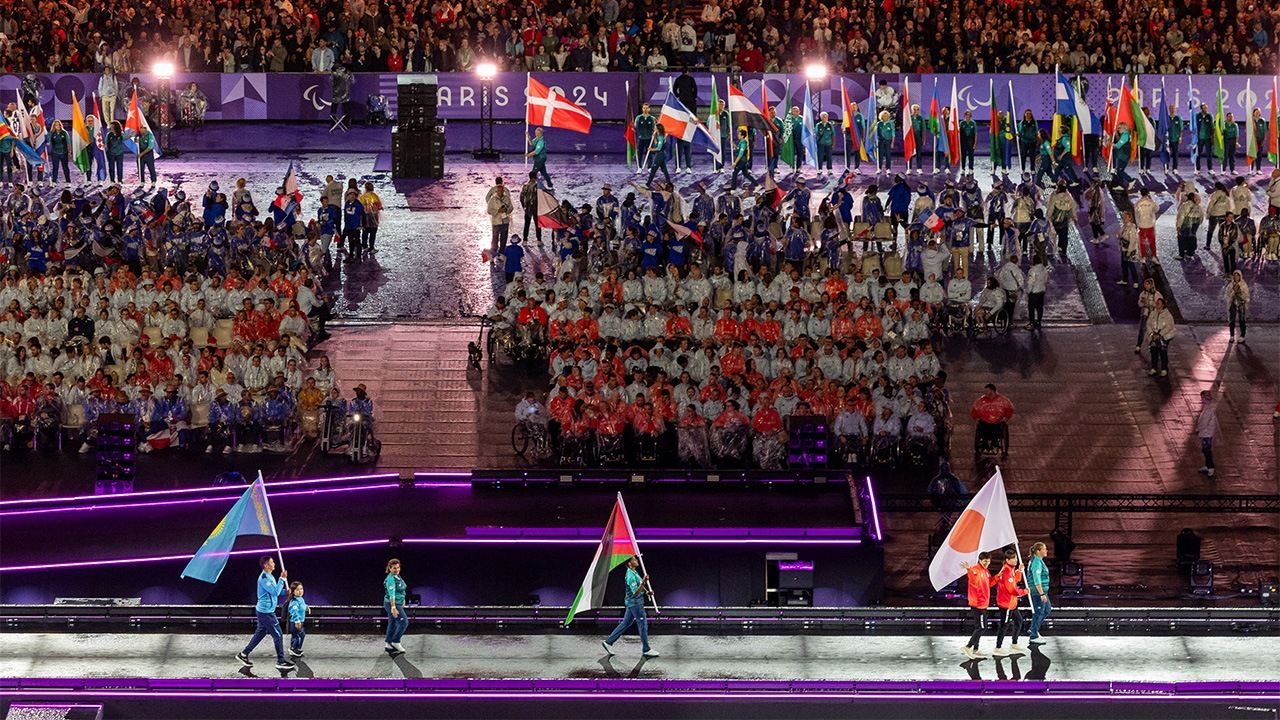
An Inclusive Paralympics: Table Tennis Gold Medalist Wada Natsuki Shines Light on Athletes with Intellectual Disabilities
Sports Society Health- English
- 日本語
- 简体字
- 繁體字
- Français
- Español
- العربية
- Русский
Dreams of Gold
The 2024 Paralympics Games in Paris brought thousands of athletes from around the world to compete in over 500 medal events spanning 22 sports. Among Japan’s medalists, Wada Natsuki, who was among a small contingent of Japanese athletes with intellectual disabilities competing at the games, made history by winning the country’s first-ever gold in Para table tennis.
Her victory and selection as Japan’s flag bearer at the closing ceremony, an honor she shared with blind Para swimmer and gold medalist Kimura Keiichi, shined a light on Paralympians with intellectual impairment.
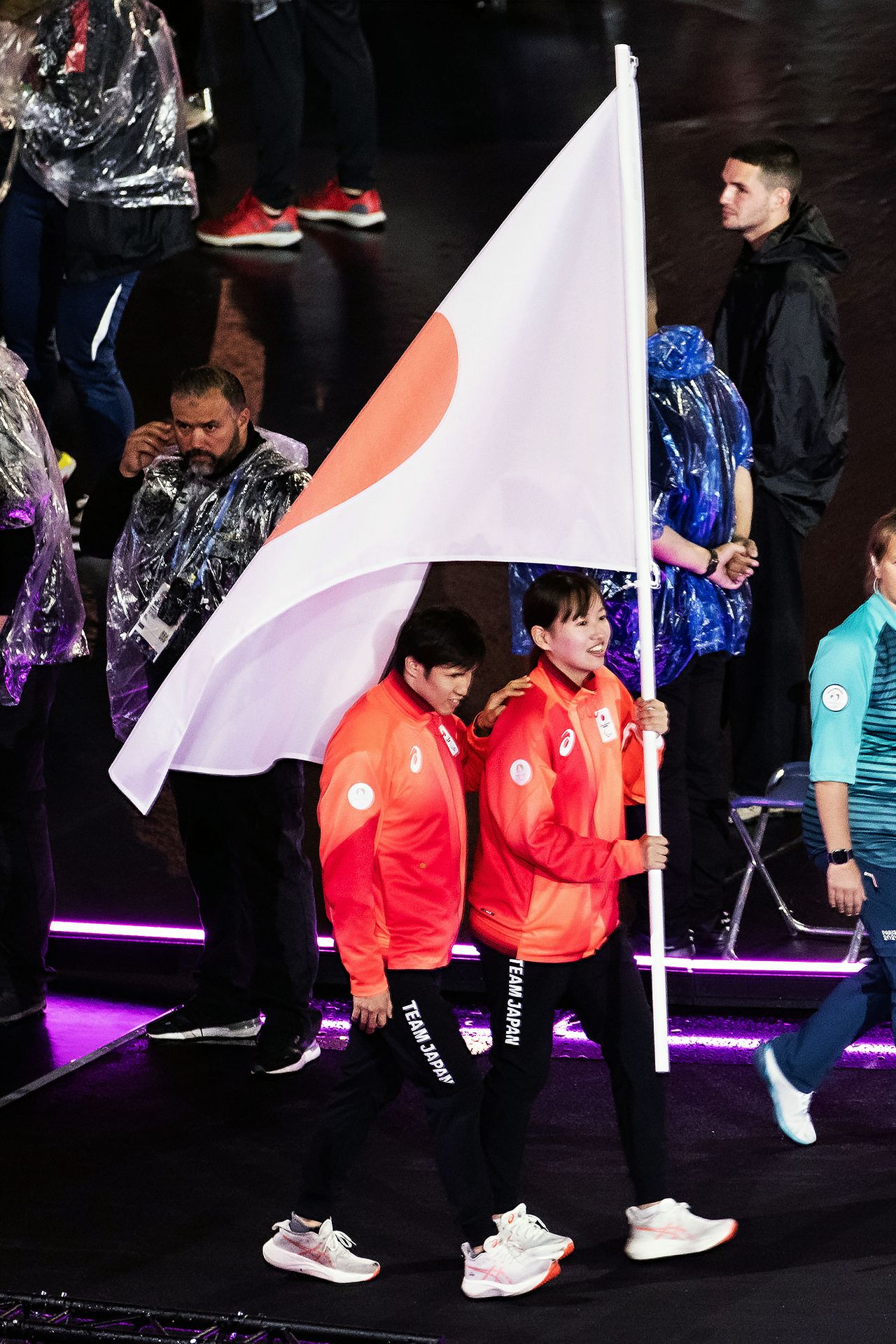
Wada Natsuki (right) and Kimura Keiichi carry the Japanese flag at the closing ceremony of the 2024 Paralympics in Paris. (© Ochi Takao)
The scene of Kimura and Wada striding proudly into the packed 80,000-seat stadium was a stirring moment. Wada, with flag carried aloft, beamed amid the cheers of the crowd and other athletes. Noting the significance of the moment, one member of the Japanese team declared that it was likely the first time for a Japanese athlete with an intellectual disability to be selected as a flag bearer.
For both Olympians and Paralympians, there are few honors as lofty as carrying the flag of your nation in the closing ceremony. Sports eliminates such distinctions as “able-bodied” and “disabled.” Competitors experience the same level of thrill at victory and disappointment at defeat, creating a fellowship of athletes.
Expressing her joy at being a flag bearer, Wada, who celebrated her twenty-first birthday during the games, declared her first Paralympics “an unforgettable experience.” Describing her feeling at winning the gold, she said, “I’m overjoyed to have achieved my dream.”
Discovering Table Tennis
Wada was among just 12 athletes with intellectual impairments who were part of the 175-member Japanese team. The Paralympics features just three sports for athletes of the classification—table tennis, swimming, and athletics—and Japan brought home four medals, with Wada’s being the lone gold. Wada’s mother expressed her gratitude for the influence table tennis has had on her daughter’s life, saying that “kids with intellectual disabilities are often cut off from the surrounding world. The sport has enabled her to experience life in ways that she wouldn’t have been able to do otherwise.”
Wada’s journey to the gold medal was filled with challenges. As a girl, she struggled to fit in at school and was bullied by her peers, leading her to spend much of her time at home. She started playing table tennis in her second year of junior high school, around the same period that she was identified as having an intellectual disability, and the sport had an immediate and positive impact. “It gave me confidence,” Wada recounts. “I was able to accept myself for who I am.”
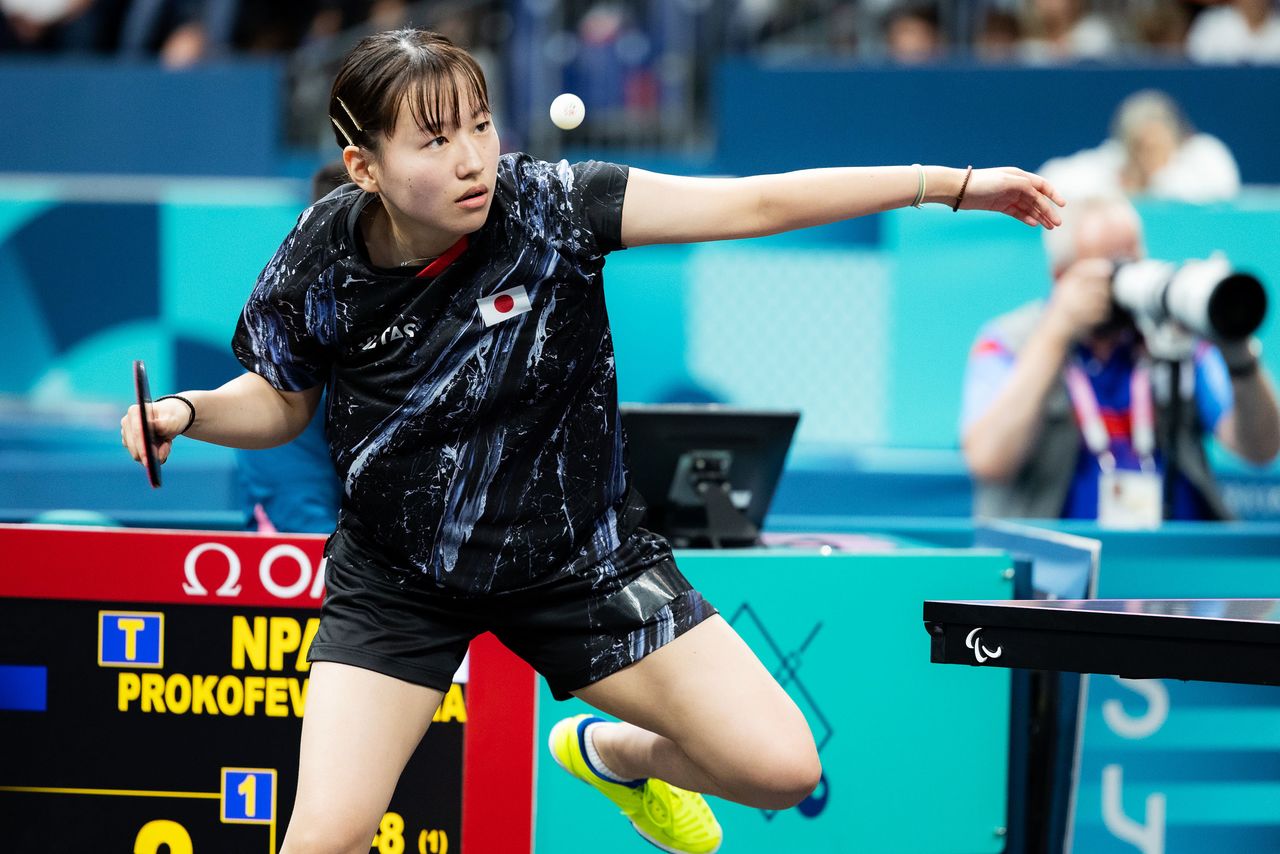
Wada returns a shot during a match at the Paris Paralympic Games. (© Ochi Takao)
She demonstrated a passion and prowess for the game from the start. She quickly mastered 10 service variations but also had a habit of shedding tears of frustration whenever things were going badly in matches or in practice. After stepping up her training in high school, she emerged as one of the top Para table tennis prospects in Japan. Since making her international debut in November 2022, she has been a dominant force, claiming singles gold in 2023 at the Asian Para Games in Hangzhou, China, and other titles prior to making history in Paris.
Wada has steadily built up her confidence with each small success. Her story demonstrates the barriers people with intellectual disabilities often confront, and how through the transformative powers of sport, they are able to break down the biases and stereotypes of those around them. Wada’s gold medal epitomizes the “Games Wide Open” theme of the Paris Olympics and Paralympics in every sense.
Speaking in an interview following the Paralympics, Wada used the impact table tennis has had on her life to encourage others with intellectual disabilities to interact more with the world around them. “Staying shut up at home isn’t the real world,” she said. “I want people to have the courage to step out and experience life more.”
Shadow of Sydney Paralympics
The inclusion of athletes with intellectual disabilities in the Paralympics has been a controversial issue, in large part because of the difficulty in classifying competitors. The 1996 Games in Atlanta featured just two sports in the category, athletics and swimming. This increased to four when basketball and table tennis were added for the Sydney Paralympics in 2000. However, scandal erupted when a member of the gold-medal-winning Spanish men’s basketball team blew the whistle to the press, unmasking 10 of the 12 players on the squad as imposters. A subsequent investigation concluded that the deception was systematically devised and carried out.
The International Paralympic Committee stripped the team of its medal, and then went a step further by suspending events for athletes with intellectual disabilities until a reliable verification system was established.
The ban remained in place for the Paralympics in Athens in 2004 and Beijing in 2008. It was finally lifted ahead of the 2012 Games in London, which featured three sports for athletes with intellectual impairments: athletics, swimming, and table tennis. There has been no change since, however, and the winter Paralympics still excludes athletes from the class.
Troubles with Categories
The IPC’s reluctance to open more sports up to athletes with intellectual disabilities comes largely down to the difficulty of classifying competitors. In Parasports, athletes are grouped into classes according to their disability to ensure fairness on the field of play. Athletic ability is determined by factors like the location of a disability, such as whether an amputation is above or below the joint, and degree of impairment. The long jump, for instance, has categories for individuals with ambulant-related and visual disabilities, intellectual impairment, and cerebral palsy, with each having different classifications with dedicated events, resulting in a barrage of competitions—there are 10 for men alone.
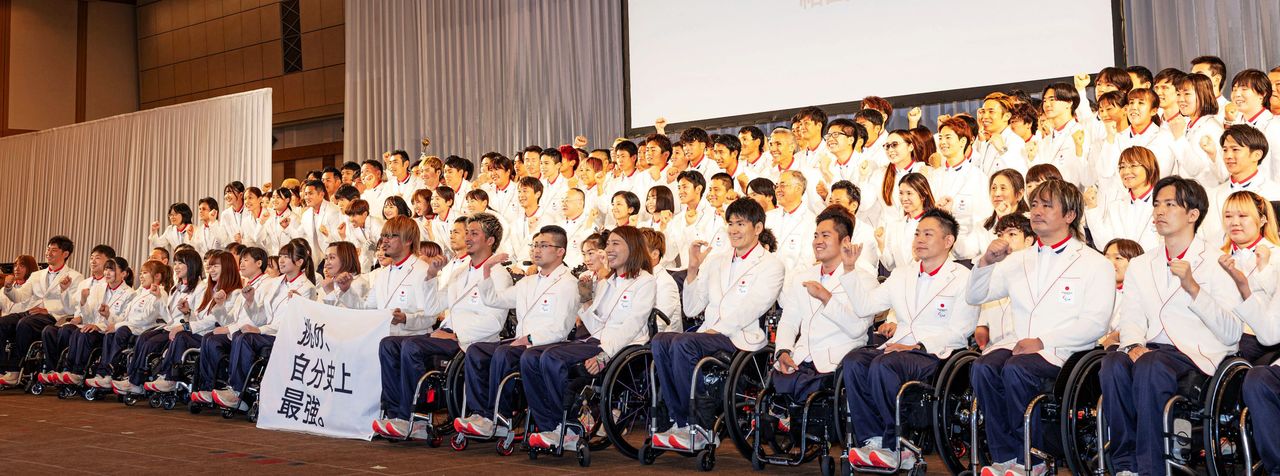
The Japanese Paralympic team unveil the team’s motto“Strive to be your best” at the official launch ceremony ahead of the Paris Games on July 16, 2024 in Tokyo. (© Ochi Takao)
There are a host of issues when it comes to classification for the various Paralympics sports, but the process is particularly challenging with intellectual impairment as the impact on sports performance is not outwardly apparent as with athletes whose disabilities are visible.
In the wake of the 2000 Sydney scandal, the IPC established a new system for verifying intellectual disability that it has applied since the London Paralympics in 2012. Athletes in the three recognized sports must fulfil the World Health Organization definition of intellectual disability, which is an IQ below 75, impairment in skills for day-to-day functioning, and occurrence of the disability before the age of 18. They must also undergo a battery of tests to receive sport-specific classification, including examination of playing techniques, computer-based assessment of cognitive skills, and observation during competitions.
Even with such a stringent classification process, the reality is that athletes with intellectual disabilities grow and improve with training and experience, often reaching a level of ability on par with even unimpaired players. In competitions, for instance, it is not uncommon for a highly experienced player to defeat a less impaired opponent, demonstrating the difficulty in setting parameters for eligibility.
Managing the Size of the Games
Another factor is the growth of the Paralympics. In 2001, the IPC signed a cooperation agreement with the International Olympic Committee with the aim of safeguarding the future of Paralympics. At the same time, it put regulations in place creating a standardized format for the Games, including limiting the number of categories and events for certain sports, establishing athlete quotas, and allocating qualifying spots to increase the level of competition.
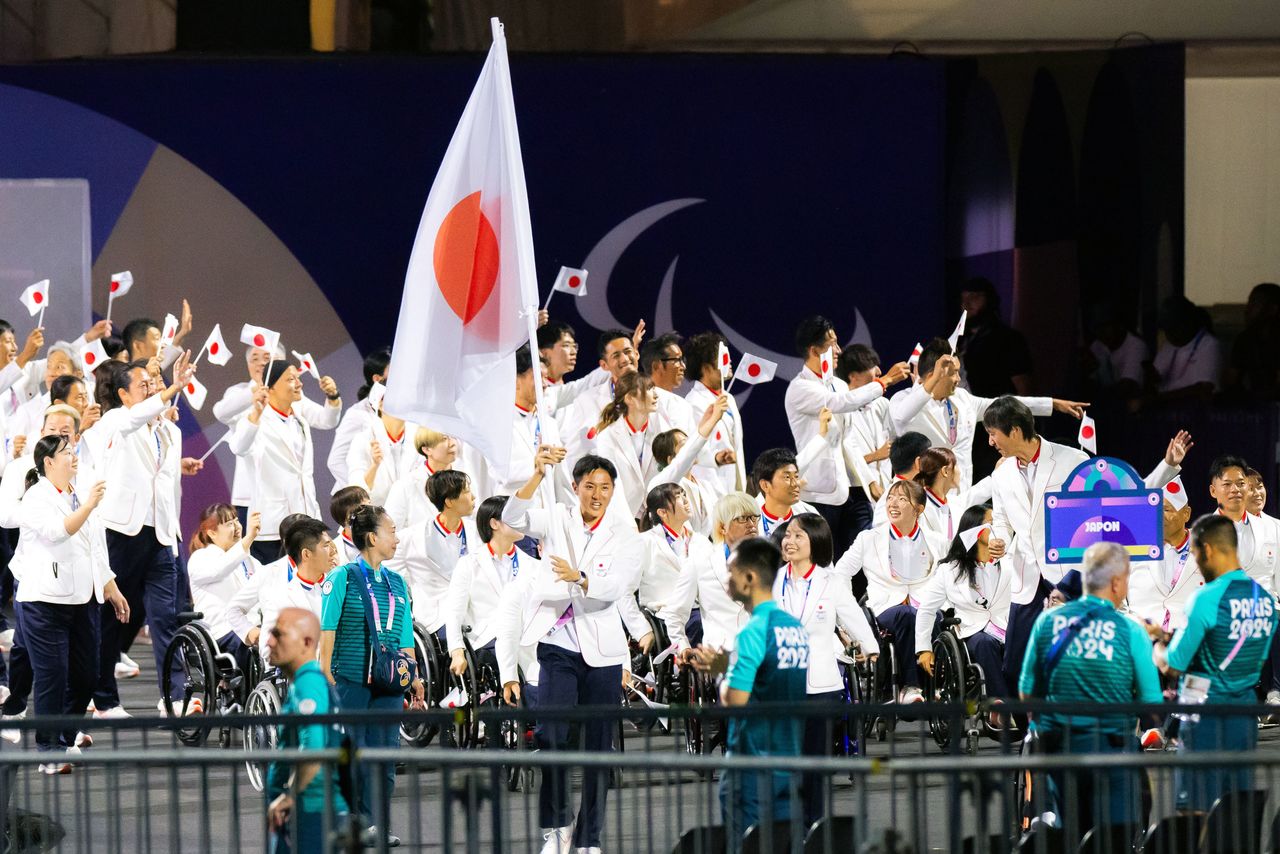
Member of the Japanese Paralympic Team at the opening ceremony of the Paris Games on August 28, 2024. (© Ochi Takao)
The number of sports open to athletes with intellectual impairments at the Paralympics was small prior to the 2001 agreement and has only narrowed further. Increasing events for the class would require a reduction elsewhere that would impact other sports and classifications. Faced with this dilemma, the IPC has chosen to maintain the current quota of events.
Inclusion of Down Syndrome
This situation has made it incredibly difficult for athletes with Down syndrome to qualify for the Paralympics. Down Syndrome is included in the intellectual disability category, but many athletes also have physical impairments that put them at a disadvantage against other participants in the class.
This has led to calls for the creation of a separate Down Syndrome category. In 2021, for instance, the parents of Spanish athlete Mikel Garcia gained media attention during the Tokyo Paralympics when they organized a petition calling for greater inclusion that garnered over 100,000 signatures.
There are, of course, other competitions open to athletes with Down syndrome. There is the Virtus Global Games, the top event for athletes with an intellectual impairment, which has a wide range of classifications and features sports like cycling, jūdō, and karate that are not included in the Paralympics. The Special Olympics organization also provides individuals with intellectual disabilities opportunities to engage in sports, with the focus being more on developing physically and emotionally than fostering competitive ability. However, the prestige and popularity of the Paralympics has strengthened demands for greater inclusivity for athletes with intellectual impairments.
The Games Ahead
Looking at the Japanese Paralympic Team at Paris, athletes with intellectual impairments made up only 6.6% of the squad. Considering that of the 4.36 million disabled people in Japan, 1.09 million are individuals with intellectual impairment, the ratio is arguably excessively low. Wada drew attention to this issue following her win. Asked about opportunities for athletes with intellectual disabilities to participate in the Paralympics, she said that while she was thrilled to win the gold medal, she understood that table tennis was one of the few sports featured at the games, stating that “I would like to see more than just the handful of events that there are now.”
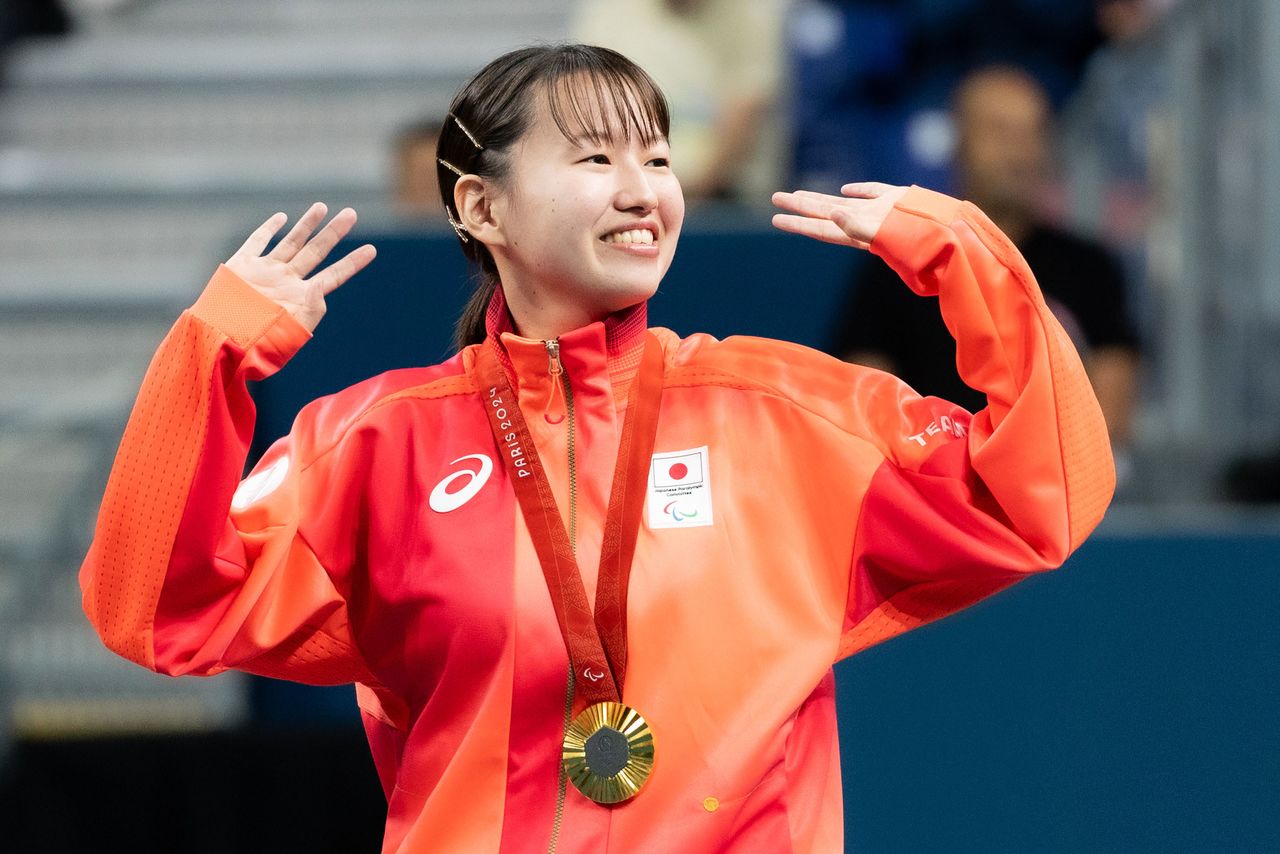
Wada shows off her gold during the medal ceremony at the Paris Paralympics. (© Ochi Takao)
Other Paralympians have also expressed the same hope. Yamaguchi Naohide, who won bronze in the 100-meter breaststroke in Paris, has called for greater opportunities for individuals with intellectual impairments. Speaking at a tournament in Britain, he said that in Japan there is still a tendency to pity people like himself. “The focus is on things we can’t do, whereas people need to learn the importance of encouraging those who are intellectually disabled to give new and different things a try.”
From this perspective, the Paralympics as an elite sporting event has huge importance in changing how society views the intellectually impaired as well as how people with intellectual disabilities see themselves. IPC president Andrew Parsons lauded the Paris Paralympics, saying the event “set new benchmarks.” The comment has been followed by media reports that the governing body is considering increasing quotas for athletes with intellectual impairment. While this gives many hope, the question remains as to what steps will be taken, if any, to make the Paralympics more inclusive of athletes with intellectual disabilities. All eyes will be on Los Angeles 2028.
(Originally published in Japanese. Banner photo: Wada Natsuki and Kimura Keiichi carry the Japanese flag at the closing ceremony of the Paralympic Games in Paris on September 8, 2024. © Ochi Takao.)
Related Tags
sports Paralympics disability Table tennis Paris 2024 table tennis
